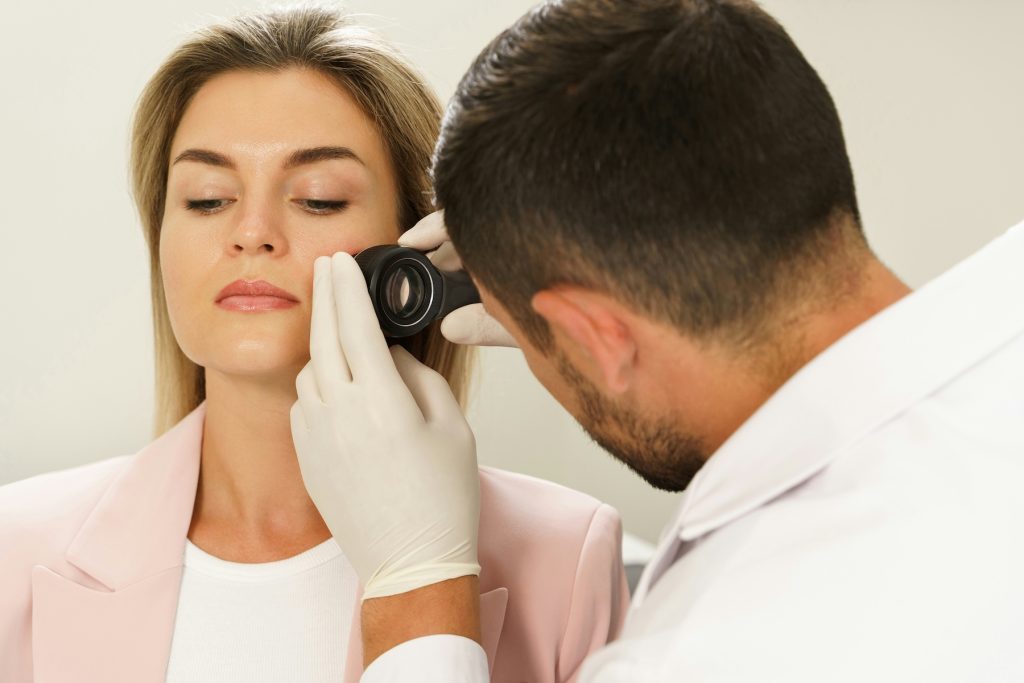You may know of dermatologists as specialists who deal predominately with the skin. But there’s much, much more to it than that.
What is a dermatologist?
A dermatologist is a specialist medical doctor who deals with the skin, hair, nails, and inside of the mouth.
In general, a dermatologist:
- Investigates physical symptoms on your skin.
- Undertakes tests to diagnose skin diseases, disorders, and ageing conditions.
- Provides treatment plans to improve the health of your skin, hair, and nails.
Dermatology can be divided into five distinct branches.
- Medical dermatology focuses on the identification, treatment, and prevention of skin conditions and diseases.
- Surgical dermatology utilises surgical processes to treat skin, hair, and nail conditions. This also includes laser surgery and cancer removal.
- Dermopathology is the study of the skin, where a dermatologist takes samples to analyse and diagnose conditions, diseases, and cancers.
- Paediatric dermatology diagnoses and treats skin conditions in children, as they can present differently when compared to conditions in adults.
- Cosmetic dermatology focuses on treatments to enhance the skin’s appearance.
What does a dermatologist do?
The skin is your body’s largest organ, so there’s a lot that dermatologists actually do in their day-to-day role.
Diagnose skin conditions
A dermatologist takes a close look at your skin. They’ll investigate things like spots, rashes, acne, eczema, and psoriasis, and provide a treatment plan. Treatments can consist of oral medication, or topical medicines, creams, and gels for your skin.
Your dermatologist will work with you in your plan, setting regular appointments to track your progress and adjust where necessary to help you improve your skin health.
Perform surgical procedures
Sometimes a diagnosis can’t be reached through a visual check. Your dermatologist might need to take a biopsy. They’ll give you a topical numbing cream, then cut out a small piece of skin from the spot to be tested, alongside a tiny portion of healthy skin as a control measure.
This process can also remove potentially cancerous spots, or remove moles completely.
Handle cancer screening and skin checks
A dermatologist can help you catch and treat skin cancers early, and support you in providing the best care for your skin.
Your dermatologist can provide a full body skin check to identify any potentially cancerous freckles, moles, or spots on your body. A skin check only takes 15-30 minutes, using a dermatoscope to take a close look at your skin and advise on any course of action that needs to be taken.
Cosmetic procedures
Cosmetic dermatologists provide non-surgical cosmetic treatments. They can provide laser therapy, but also procedures for aesthetic purposes, like botox and dermal fillers.

How do you become a dermatologist?
Becoming a dermatologist isn’t a quick pathway. It takes passion, and focus. Grit, and determination. If you’re considering a career in dermatology, a strong academic record is critical. But you also need to demonstrate the right skills during your medical training. Skills like attention to detail, exceptional hand-eye coordination, and above all, compassion.
It takes a minimum of 12 years to become a registered dermatologist. There are a number of steps involved:
- Complete a Bachelor of Medicine.
- Complete a minimum two years of practical medical experience in hospitals, to become a registered medical practitioner
- Once registered, undergo a four-year training program to become a dermatologist and receive the coveted Australian College of Dermatologists Fellowship.
What are some common myths about dermatology?
Myth 1: You Only Need a Dermatologist If You Have Acne
While acne is one of the most common reasons people see a dermatologist, it’s far from the only one. In Australia, dermatologists play a crucial role in diagnosing and treating a wide range of conditions—from skin cancers and eczema to psoriasis, rosacea, and hair loss.
Australia has one of the highest rates of skin cancer in the world, making regular visits to a dermatologist not just for cosmetic concerns, but potentially life-saving.
Myth 2: A GP Can Handle All Skin Issues
It’s true that general practitioners (GPs) can treat minor skin concerns, but dermatologists are specialist doctors with additional years of training focused solely on skin, hair, and nails. In many cases, a GP will refer patients to a dermatologist for more complex or persistent issues—especially when there’s a suspicious mole, recurring rash, or skin infection that doesn’t respond to first-line treatment.
In Australia, you usually need a GP referral to see a dermatologist under Medicare, which also helps keep your out-of-pocket costs lower.
Myth 3: Dermatologists Are Just “Skin Doctors” for Cosmetic Procedures
Yes, dermatologists offer cosmetic treatments like laser therapy, anti-wrinkle injections, and chemical peels—but their work goes far beyond aesthetics. In Australia, they are at the front lines of skin cancer detection and prevention, which is critical in a country where melanoma is one of the most commonly diagnosed cancers.
Their role is both medical and surgical, and many perform skin cancer checks, biopsies, and removal of malignant lesions in-clinic.
Myth 5: You Only Need to See a Dermatologist in Summer
Skin checks and dermatology visits shouldn’t be limited to summer—even though that’s when Australians tend to think about sun safety most. Skin cancer can develop year-round, and regular checks (ideally once a year or as recommended) are essential for early detection.
Melanomas can appear in places not commonly exposed to the sun, like your scalp, soles of your feet, or under nails—which is why a professional skin check is so important.
Contact your local Bunbury dermatologist
A dermatologist plays a vital role in supporting and promoting your skin health. So whether it’s a rash, a wrinkle, a mole, or you want a full-body skin check, contact our Bunbury dermatologists today to discuss how we can help support your skin.
